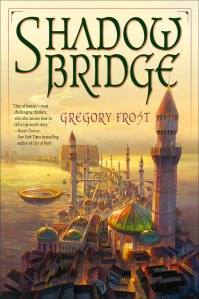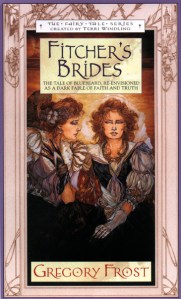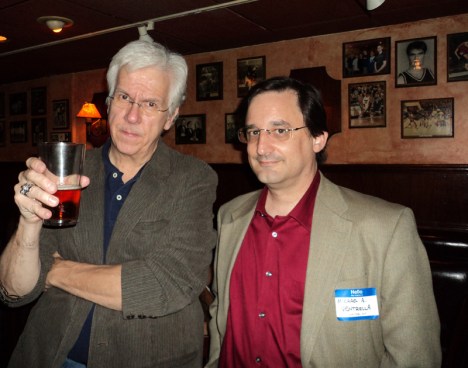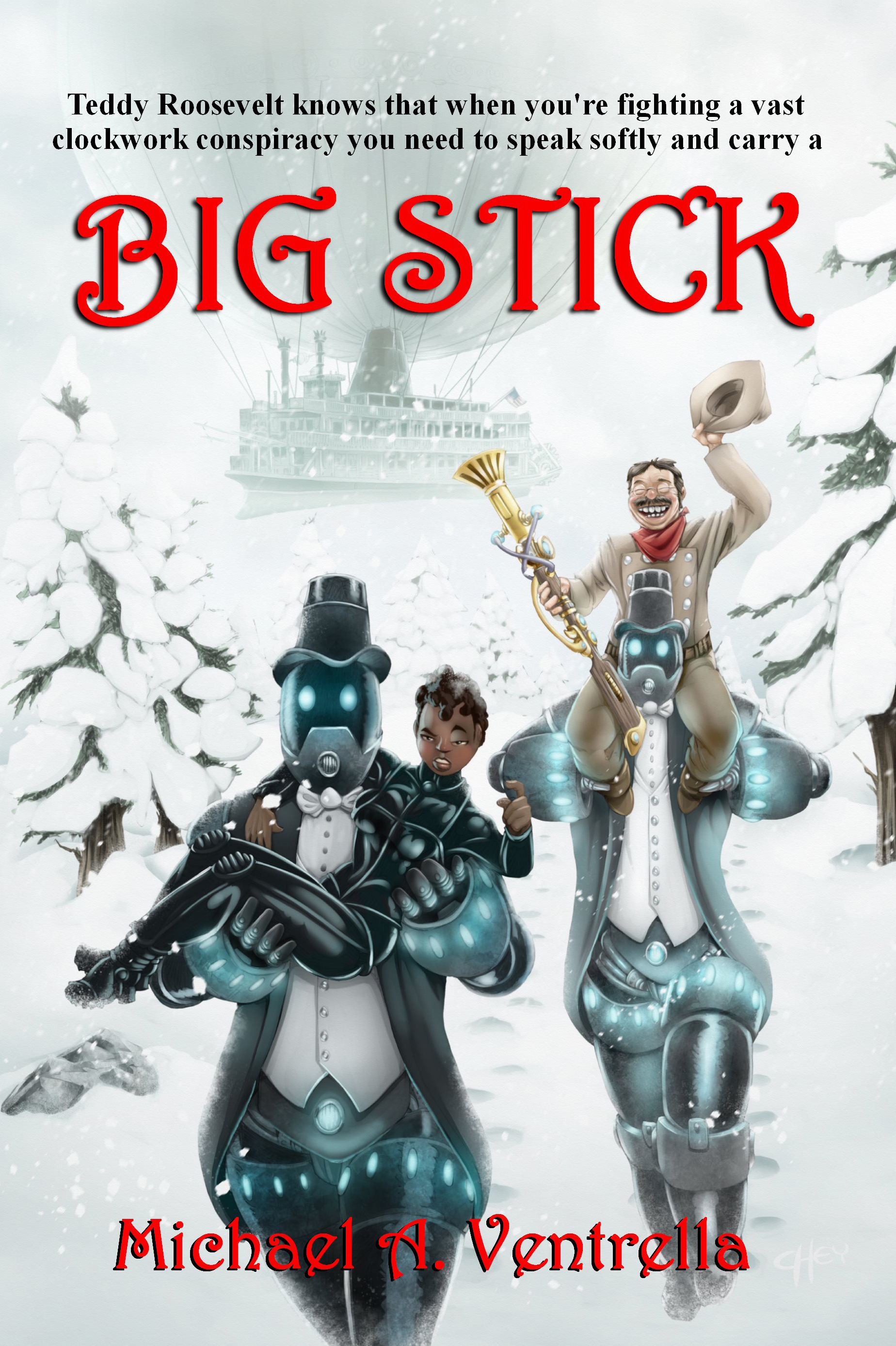Gregory Frost is the author of the Shadowbridge duology, SHADOWBRIDGE and LORD TOPHET. His latest short fiction appears in the anthology POE, edited by Ellen Datlow. He’s been a finalist for every award in the sf, fantasy, and horror genres. Other works include LYREC, TAIN, REMSCELA, THE PURE COLD LIGHT, FITCHER’S BRIDES, and the short fiction collection ATTACK IF THE JAZZ GIANTS & OTHER STORIES.  His essay on Slipstream fiction appears in Modern Fantasy Literature (Cambridge University Press), co-edited by Farah Mendelsohn. For two years he was the principal researcher for a non-fiction television producer, for shows that appeared on The Learning Channel and The Discovery Channel. Currently he is the acting Fiction Writing Workshop Director at Swarthmore College, in Swarthmore, PA, and teaches in writing programs in and around the Delaware Valley. His web page is Gregoryfrost.com.
His essay on Slipstream fiction appears in Modern Fantasy Literature (Cambridge University Press), co-edited by Farah Mendelsohn. For two years he was the principal researcher for a non-fiction television producer, for shows that appeared on The Learning Channel and The Discovery Channel. Currently he is the acting Fiction Writing Workshop Director at Swarthmore College, in Swarthmore, PA, and teaches in writing programs in and around the Delaware Valley. His web page is Gregoryfrost.com.
MICHAEL A. VENTRELLA: I’m pleased to be interviewing Gregory Frost. I first became aware of Frost with his initial novel LYREC which I remember reading on the Boston subway back in the 80s. Although I have not re-read it since then, I recall it being quite fun with some real issues about religious beliefs…
Gregory, was LYREC the first novel you had written? What made you decide on that theme for your first novel? (PS: My wife says to tell you she loved that book.) Any news on it being re-issued?
GREGORY FROST: LYREC was the first novel that was published. Hardly the first one I’d written. In fact my first attempt at a novel was about 70 pages long. The second attempt was, at least, of an appropriate length, around 250 pages. But it and numerous others live in a box in a closet, which is where they belong. That second one made its way to Lin Carter, who was editing the Ballantine Adult Fantasy Series in those days (that should date me), courtesy of a letter of introduction from one David Gerrold, who’d never even met me. And Carter, bless him, did a line edit on the first 10 pages, showing me how much I did not understand of the craft. It would be a decade after that before I sold LYREC. But both Gerrold’s letter and Carter’s efforts were acts of kindness on their part. I think apiring authors should always stiffen their spines and talk to published writers. Trust me, only some of us bite. The zombie writers…yeah, you should probably not talk to the zombies.
I expect LYREC would have been a YA novel had there been such a category in ’84. Main character is an alien who has little experience with human emotions and finds himself greatly overcome by them as he inhabits a human body; he has to sort out his angry, warring and violent impulses. And his sidekick is unable to manifest as a human and so goes through the book as a large talking cat with attitude. I was trying to do something with fantasy besides interminable trilogies and quests. So there’s way more Fafhrd and the Grey Mouser in there than there is Tolkien or Robert E. Howard. I love Fritz Leiber, and those stories of his were unquestionably influential. Roger Zelazny’s work, too. It’s fresh, funny, different. I was shooting for all that with LYREC. A really good ride.
And at the moment there’s a possibility it’s coming back into print from Wilder Press this winter. Negotiations on that front continue, and I don’t know how that’ll fall out.
VENTRELLA: How did you break into the publishing business at that time?
FROST: I broke in by publishing a short story (in The Twilight Zone Magazine for the old people in the audience), and then in quick succession two more in F&SF, and around then at a convention I met Terri Windling, who at the time was an editor at Ace Books. I was in the middle of a draft of a novel based on the Irish epic The Tain, and the idea excited her. She agreed to look at LYREC, I think, pretty much on the strength of the idea that I was going to do my version of Cú Chulainn.
VENTRELLA: Has the business changed much since then?
Back then a publisher would try to develop a relationship with you—grow your career, so to speak. Now you’d better write a bloody best-seller coming out of the chute or you’re for it, mate. The bean-counters will look at your numbers and instead of thinking, “We can promote her next book and sell even more,” they go “Huh, your numbers weren’t great, so we’re not going to publish you at all!” That is the current reality. I can’t even tell you how many writers I know of who published a portion of a trilogy or series with a full character arc, only to have the publisher say in the middle of it, “Don’t bother to finish. We don’t want the last book(s) because your sales haven’t been great.” It’s ugly—and bovinely stupid—out there.
One of the books I use in teaching writing is THE GREAT GATSBY because so much of the correspondence between Fitzgerald and Maxwell Perkins, his editor, is available to us. And it’s interesting to see how much of that book was pulled together during the editing and revision process. Fitzgerald did not turn in a fine, complete, perfect manuscript. Far from it—the original Jay Gatsby was a complete cypher, even to the author. But nowadays that’s what you’re expected to do, turn in a perfect, finished work. Editors are now responsible for twenty more times the number of books in any given minute, so they can’t take the time to guide, to work in close that way. Someone like David Hartwell may still take such carewith selected authors, but he’s a dying breed. Everything now is Walmartized, the whole process. And it is not giving us better literature.
VENTRELLA: You have not limited yourself to one specific genre. While certainly that is very admirable artistically, do you feel that may harm you professionally? Should authors try to “specialize”?
FROST: I wouldn’t recommend the genre hopping as a career move. But then I wouldn’t recommend you be slow and methodical, either, in the genres.
Okay, I was having lunch with two contemporary authors a few days ago, Rachel Pastan (LADY OF THE SNAKES) and Asali Solomon (GET DOWN). And Rachel expressed to Asali how prolific I am. I mean, I had two books out last year. I’m now working on what I hope are final revisions of a supernatural mystery. I protested that I’d been working on this thing for 18 months and that was after setting it aside to write LORD TOPHET when Random House picked up SHADOWBRIDGE. And in discussing this, I realized that for a contemporary—let’s say (snootily) literary—author, a decade between books isn’t particularly shocking or unusual. 
Asali’s collection came out a few years ago, and she’s under contract to produce a second book. But nobody’s going mad wondering where it is, and she’s still pondering it. Now, I took seven years probably from beginning to end to write SHADOWBRIDGE, and got nothing but shit about it from reviewers and interviewers. You take that much time in the genres and you’re immediately suspect. There’s this kind of “You’re writing entertainments, so if you took that long there must have been a problem” thing going on. We’re expected to knock out a book a year, in the same mold as the last book. You want a career, you should be doing that. You’re not supposed to be spending years crafting sentences.
Anyway, not answering your questions exactly, am I? Short answer: I write what I feel like writing. Always have. Always will. No, it’s not a smart career move when the industry and fan-base wants volume 18 of the seemingly endless saga of Morgock the Swordbelcher, or the eighth alternate history of some damn war that you haven’t added laser weapons to yet. Truth is, if you can stomach doing that and you’re fast, go do it, because you will definitely see more financial reward. Going off into the dark and changing up every time will likely not do this for you. Especially if you’re slow. But I’m stuck with me and that’s how I am. Contrarian by nature.
Having said that, I do write stories for anthologies that I’m invited to contribute to, provided I can think of something that fits within the proposed theme. But I have to get interested. I turned in a werewolf story for an anthology Darrell Schweitzer put together. But I only did it because I got to write a Donald Westlake werewolf story. And for another anthology of Darrell’s, of vampire stories, I wrote one because it allowed me to create a fifteen minute version of Homer’s The Iliad.
There has to be something to interest me and get me beyond the “oh, great, another vampire book” response, which is invariably my first reaction. TWILIGHT? Oh, please kill me now. (Of course, he said, mine wouldn’t be like that.) Also my response to anything to do with King Arthur, bands of small hairy men on terrible quests, or brutish brooding barbarians. The best King Arthur work since T.H. White was a throwaway piece penned originally as a Christmas card by the late John M. Ford. No one else has even come close. The best barbarian was in Ian Banks’ THE BRIDGE.
VENTRELLA: What is the basic theme of the SHADOWBRIDGE series? What’s the long term plan for the storyline?
FROST: The basic theme is that the books are and will be all about stories and storytelling. The first two are about Leodora aka “Jax”, who travels the world of Shadowbridge collecting stories and performing them. She sort of finds herself obsessed with learning stories and eventually discovers that her own exploits are becoming mythic, stories are being told of her. And finally her very life depends on knowing one particular story, one particular truth.
I built the world to be open-ended, and part of the first book’s challenge was winnowing down the breadth of possibilities into one large canvas on which creation myths, kitsune tales, stories about Death, and ghost stories could all float. With one exception the stories were written where they showed up. And I have a couple that never found their place, so they’re sitting off in a notebook, raring to be used somewhere, sometime.
VENTRELLA: Not every writing technique works for everyone, but what’s your writing process? Do you use extensive outlines?
FROST: No, not every technique works, and no two people have the same process. So I cannot advocate what I do in the sense of saying “you must do this.” In fact, anyone who says “You must do this” is at best telling you what they must do.
I’ve adopted what I call the John Cleese method of outlining, which sounds like a joke but isn’t. I heard him interviewed, describing how he and Connie Booth had written “Fawlty Towers” episodes by stretching a sheet of butcher’s paper across his living room and then writing the things they knew, or thought they knew, in about the place where that seemed it should happen. Started out with just a few things and then added to it, building a timeline of a sort.
So I have boxes of this old useless pinfeed paper, and I now take five or more sheets of it and do the same thing—write what I think I know, approximately where it seems to belong in the book, and then add to it. Build it up. And once it’s done, I’ll pretty much ignore it and go write. Usually by that point I’ve already done a few scenes or chapters anyway, because something got me interested. For the Shadowbridge books, I had a draft of the final dialogue between Leodora and Tophet done before I’d started the second book or had any notion of how I would arrive at that dialogue.
And about a third of the way into the book, I’ll usually find that the outline is invalid, because something better came along while I was writing and I took a left turn at Albuquerque. So I’ll do another outline as verification that I’ve still got a story going. And then I’ll write forward. And on top of that, I’m writing longhand. With a fountain pen (and Noodler’s Inks). Now, how in the world could I recommend that process to any sane human being?
VENTRELLA: Of which book are you most proud? What would you like to be remembered for?
FROST: Currently, I’d like to be remembered for the Shadowbridge duology and for FITCHER’S BRIDES, which I think was a hellishly good novel of horror. I think I did up Bluebeard pretty well for Terri Windling with that book (I seem destined never to stray very far from Terri’s influence). On the other hand, since joining Facebook and other online communities, I’ve been floored by people who have read TAIN and REMSCELA to the point where the pages are falling apart and claim these are their favorite books in the world. So (to quote Bill Murray), I’ve got that going for me…which is nice. 
(Oh, and there’s a limited small-press edition of those books in one volume, by a publisher who went out of business, so if anyone’s still searching for them, get in touch, because I have all the remaining copies…)
VENTRELLA: What’s your opinion on e-books? Do you think they’re the wave of the future or a step down from traditional publishing?
FROST: It may be the thing that saves us all. My agent swears by her Kindle. I expect Apple will come up with an iNovels reader in the near future (you heard it here first) that tries to do for literature what the iPod did with music. I think we’ll reach the point where bookstores become places that make the book for you on the spot, eliminating the returns and distribution problems that plague this idiotic industry now. Put in your order, get your book in twenty minutes, like a pizza. I think if America wasn’t so pig ignorant we’d be making books from hemp paper now, which would cut costs ridiculously since, you know, it’s a weed that grows almost anywhere, like kudzu. But that would not make timber and paper industries happy, just as alternative energy sources infuriate Big Oil…so until you kill the chuckleheads, it probably won’t happen and you’ll shortly pay $10 for a mass market paperback.
Essentially, I’m for anything that puts books in the hands—and minds—of people, and makes them kill their TVs. Invite me to your house. I’ll kill your TV for you.
VENTRELLA: Tell me about the Liar’s Club and what you hope to accomplish with it. And be sure to let me know when you are accepting applications for other members.
FROST: The Liars Club of Philadelphia is a small collective of authors from across and outside the genres who felt that we could do more to promote ourselves as a collective. The baker’s dozen includes Bram Stoker Award Winner Jonathan Maberry and bestselling author William Lashner. We’ve been doing a “Liars Club Tells the Truth” tour now for about 6 months in and around the Delaware Valley, strictly at libraries and independent bookstores. We’re trying to promote the indies as well as ourselves. When the dinosaurs die (and Borders, I’m talking to you), then our hope is the independents will move back into the spaces that they were squeezed out of by these small-brained leviathans. We’re doing our part to help by throwing bashes at the bookstores and bringing in as many people as we can get. Here’s a link to our latest outing, at Aaron’s Books in Lititz, PA (http://liarsclubphilly.com/?p=189)
Filed under: writing | Tagged: e-books, first draft, Gregory Frost, Lyrec, publishing house, Shadowbridge, short stories, writing advice |




Great interview! I especially liked the stuff about writing methods (being an aspiring writer myself). I’ll have to check out the Shadowbridge books sometime!
LikeLike
Good interview!
LikeLike
Goodly interview…always fun to pick Greg’s brain about process. Mmmm, brains!
You seem to have pricked most of his hobbyhorses, kudos. Of course, he has so very many of them so maybe it was like shooting fish in a barrel.
Oz
LikeLike
Love those left turns at Albuquerque.
LikeLike